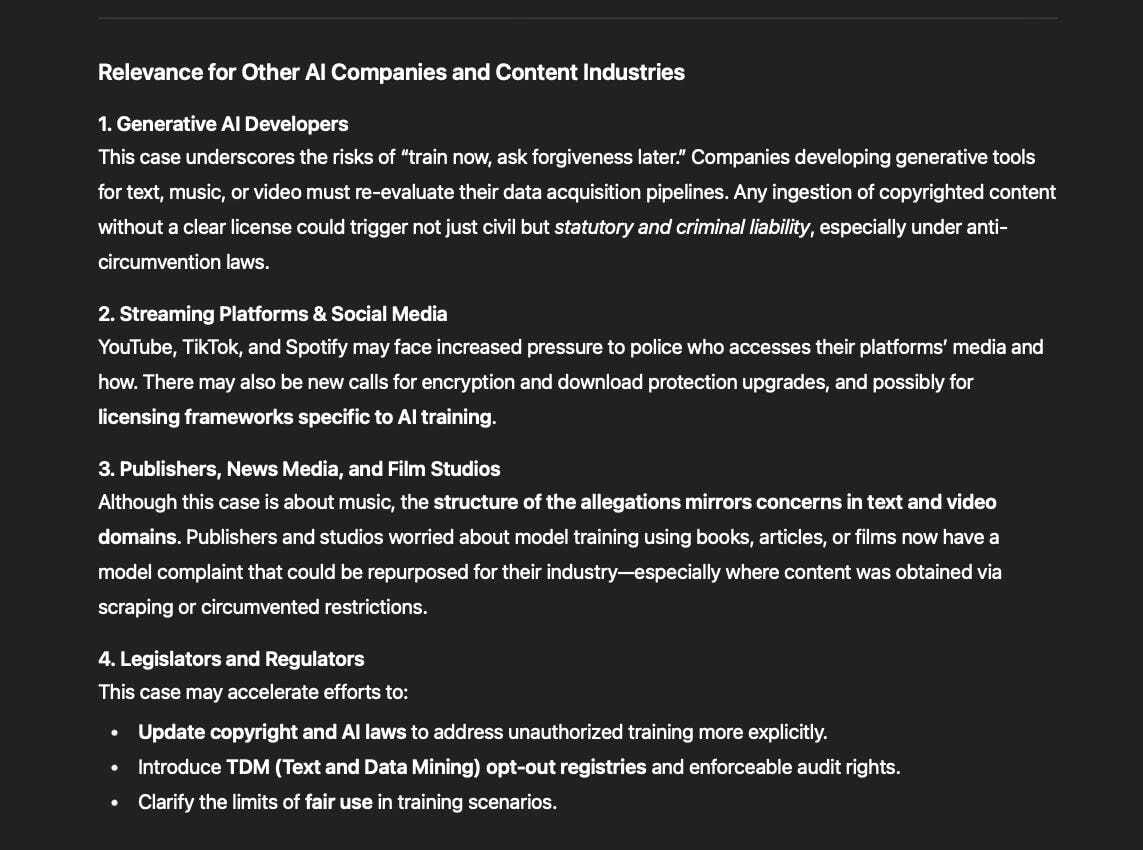- Pascal's Chatbot Q&As
- Posts
- Amended Suno complaint reflects strategic shift. By directly accusing the company of violating anti-circumvention laws, illegal scraping and generating outputs indistinguishable from copyrighted works
Amended Suno complaint reflects strategic shift. By directly accusing the company of violating anti-circumvention laws, illegal scraping and generating outputs indistinguishable from copyrighted works
...the record labels are laying the groundwork for a watershed ruling shaping AI training, copyright enforcement, and the emerging frontier between machine-generated and human-created culture.
The Suno Case and Its Far-Reaching Implications for AI and Content Industries
by ChatGPT-4o
Introduction
In a landmark development for AI and copyright law, major record labels including Universal Music Group (UMG), Sony Music Entertainment, and Warner Music Group have amended their lawsuit against Suno, Inc.—an AI startup that produces music via generative models. The new claims, filed on September 19, 2025, accuse Suno of not only unauthorized use of copyrighted sound recordings but also of circumventing YouTube’s technological protections to illegally “stream rip” the content used to train its AI models.
The case is a potential game-changer, both in terms of legal precedent and business practices. Below, we unpack the changes in the amended complaint, their importance, possible consequences for Suno, and the wider implications for other sectors using AI-generated content.
Key Changes in the Amended Complaint
The amended complaint introduces several crucial additions:
Allegation of DMCA Violation (Anti-Circumvention Clause, §1201):
Suno is now accused of violating the Digital Millennium Copyright Act (DMCA) by intentionally bypassing YouTube’s rolling cipher encryption to access and download copyrighted music content.Stream Ripping from YouTube as Primary Ingestion Method:
Plaintiffs claim that Suno built its training corpus—“decades worth of the world’s most popular sound recordings”—by illegally copying tracks directly from YouTube using stream ripping tools.Evidence of Overfitting and Derivative Works:
Plaintiffs conducted internal testing showing that prompts tailored to mimic famous recordings led to Suno generating output that mimicked the melodies, structures, and even producer tags of specific copyrighted tracks (e.g., Chuck Berry’s Johnny B. Goode, Michael Bublé’s Sway).Rejection of Suno’s Fair Use Defense:
The labels preemptively attack Suno’s fair use argument by arguing that no transformative purpose exists and that the use is purely commercial and substitutive in nature—directly competing with human-created musicsuno-proposed-amended-complaint.
Why These Changes Matter
These new allegations elevate the lawsuit from a typical copyright infringement case to one of potentially criminal violation of the DMCA. This means:
Higher statutory penalties: Plaintiffs are now seeking $2,500 per circumvention act and up to $150,000 per infringed work, which could multiply rapidly given the scale of training involvedRecord labels claim AI generato….
Increased evidentiary burden on Suno: The company’s refusal to disclose its training datasets and its vague public statements ("mix of proprietary and public data") are now at odds with strong, specific technical accusations and experimental evidence by the plaintiffssuno-proposed-amended-complaint.
Additionally, the use of YouTube—a platform that itself uses encryption to restrict downloading—adds a layer of technological infringement. The use of circumvention tools to ingest content may not be shielded under any current exceptions to DMCA §1201.
Consequences for Suno
If the claims hold up in court, Suno could face:
Severe financial liability: Given the number of works involved, damages could reach hundreds of millions.
Injunctions and loss of business viability: A court could order Suno to shut down or retrain its models using licensed data only.
Reputational damage and investor fallout: The complaint cites a Suno investor who admitted that the company was designed to "avoid constraints" like licensing. This may discourage future investment and cast doubt on the startup’s legal and ethical foundationssuno-proposed-amended-complaint.
Relevance for Other AI Companies and Content Industries
1. Generative AI Developers
This case underscores the risks of “train now, ask forgiveness later.” Companies developing generative tools for text, music, or video must re-evaluate their data acquisition pipelines. Any ingestion of copyrighted content without a clear license could trigger not just civil but statutory and criminal liability, especially under anti-circumvention laws.
YouTube, TikTok, and Spotify may face increased pressure to police who accesses their platforms’ media and how. There may also be new calls for encryption and download protection upgrades, and possibly for licensing frameworks specific to AI training.
3. Publishers, News Media, and Film Studios
Although this case is about music, the structure of the allegations mirrors concerns in text and video domains. Publishers and studios worried about model training using books, articles, or films now have a model complaint that could be repurposed for their industry—especially where content was obtained via scraping or circumvented restrictions.
4. Legislators and Regulators
This case may accelerate efforts to:
Update copyright and AI laws to address unauthorized training more explicitly.
Introduce TDM (Text and Data Mining) opt-out registries and enforceable audit rights.
Clarify the limits of fair use in training scenarios.
Conclusion
The amended Suno complaint reflects a strategic and aggressive legal shift. By directly accusing the company of violating anti-circumvention laws, illegally scraping content from YouTube, and generating overfit outputs indistinguishable from copyrighted works, the record labels are laying the groundwork for a watershed ruling.
If successful, this case could establish a powerful precedent: AI developers cannot sidestep copyright by obscuring their training methods, especially when the resulting outputs mimic the very works they ingest. The case could shape how all creative industries approach AI training, copyright enforcement, and the emerging frontier between machine-generated and human-created culture.
